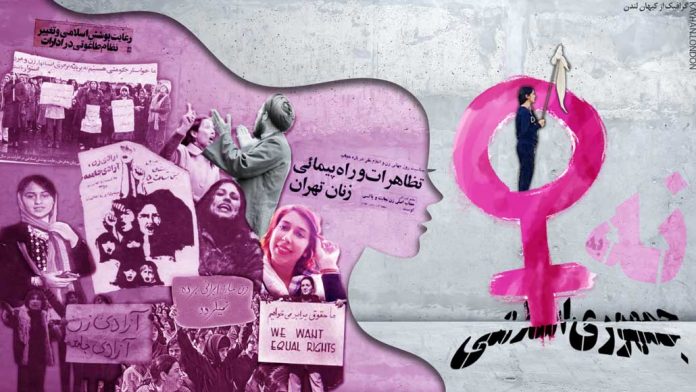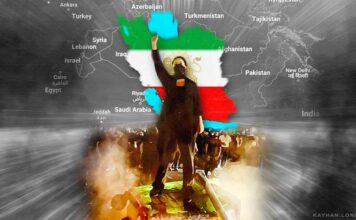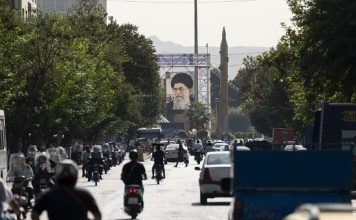Many Iranians, including a significant number of women inside and outside the country, have joined an online campaign titled “No to the Islamic Republic” launched earlier this month by some 600 rights activists, political dissidents, artists, athletes, and academics living abroad.
This article explores the issues that have motivated the free-thinking Iranian mothers, fathers, rights activists, and ordinary women who seek justice, and reject the Islamic Republic. It makes a case for why women should lead the “No to the Islamic Republic” campaign.
[aesop_image img=”https://kayhanlife.com/wp-content/uploads/2021/04/2005-06-12T120000Z_641054760_RP6DRMUKYRAA_RTRMADP_3_IRAN.jpg” panorama=”off” credit=”Iranian women take part in a protest in front of the Tehran University in Tehran. FILE PHOTO/REUTERS./ ” align=”center” lightbox=”on” captionsrc=”custom” captionposition=”left” revealfx=”off” overlay_revealfx=”off”]
Shortly after Ayatollah Ruhollah Khomeini, the founder of the Islamic Revolution, announced his plan to introduce the mandatory hijab, people poured into the streets on Feb. 20, 1979, protesting the measure. The incident marked the first act of civil disobedience under the Islamic Republic.
Although the protests forced Mr. Khomeini to back down and delay implementing the mandatory hijab by three years, religious decrees immediately replaced all previous civil and criminal laws protecting women’s rights. The measures marked one of the darkest periods in the social and political life of women in Iran.
After the February protest, the mandatory hijab became the Islamic Republic’s red line and the cornerstone of its theocratic power and rule. It also became the regime’s principal tool to control people, particularly women.
Replacing civil codes, including family law, with Islamic Sharia (religious law) has enabled the state to discriminate against women in every aspect of their lives. Institutionalized sexism, stemming from chauvinistic and patriarchal religious laws, has made women mere property of their fathers, brothers, husbands, and grandfathers.
While women have been treated as second-class citizens in many countries throughout history, their rights have been systematically violated under the Islamic Republic’s blatantly discriminatory Sharia laws. Women have significantly fewer rights than men under the current Iranian criminal and civil laws.
The Islamic Republic’s propaganda machine continually reinforces the notion that a woman is a property of “male honor,” which means that she cannot hold a job or travel abroad without her husband or male guardian’s express consent. These misogynistic and inhumane laws have halted the social, political, and professional development of half of the Iranian population in the past four decades.
These discriminatory laws and practices are pervasive and affect women in every field and profession, including sports.
The husband of Samira Zargari, the Iranian National Women’s Alpine Ski Team coach, banned her from traveling with the team to Cortina d’Ampezzo, Italy, on Feb. 17 to compete in the world ski championships.
“Being banned from leaving [Iran] by my husband was not merely a private and family matter,” Zargari tweeted on Feb. 17. “My pain is the pain of all Iranian women.”
Another female athlete, Niloufar Ardalan, a member of the Iranian Women’s Football Team, missed the Asian Cup in 2015 after her husband banned her from traveling abroad. Ms. Ardalan’s husband also prevented her from traveling to Guatemala to compete in the World Championship the same year. In the end, Ardalan was able to travel with the women football team to Mexico after the Iranian Football Federation championed her cause, leading to a court in Tehran ruling in her favor, the report added.
Professional female athletes do not have access to the same facilities and equipment as their male counterparts. They also face severe restrictions because of the mandatory hijab, making it challenging for them to train as cyclists or rock climbers or engage in any contact sports. Women cannot attend large stadiums to watch men’s football matches.
Besides violating women’s civil liberties, the Islamic Republic has also restricted women’s ability to take part in artistic and cultural activities. Under current laws, female musicians are banned from holding solo public performances. The regime is inherently hostile towards cultural activities and actively discriminates against women artists and musicians.
While women face systematic and widespread discrimination globally, even in developed countries, the situation is much worse in Iran. Many girls and women are prevented from pursuing their higher education and professional careers in foreign countries. As a result, women have not played a meaningful role in the Iranian economy in the past 40 years. A UN report in 2018 ranked Iran 118 out of 162 countries in the Gender Inequality Index (GII). There are 31 million women above the age of 15 in Iran, of whom less than 4.4 million are gainfully employed.
[aesop_image img=”https://kayhanlife.com/wp-content/uploads/2020/07/2009-06-13T000000Z_1571981362_GM1E56D1MTL02_RTRMADP_3_IRAN-ELECTION-CLASH-scaled.jpg” panorama=”off” credit=”Iranians protest in front of the police in Tehran. REUTERS./FILE PHOTO” align=”center” lightbox=”on” captionsrc=”custom” captionposition=”left” revealfx=”off” overlay_revealfx=”off”]
The Islamic Republic’s criminal law does not protect women who are victims of acid attacks. Men who commit violent crimes against women, including “honor killings,” are not prosecuted, or are given light prison sentences.
Iranian women, who comprise half of the country’s population, have continually fought against institutionalized discrimination in the past four decades. They are an integral part of the “No to the Islamic Republic” campaign. The movement against the mandatory hijab has angered and frustrated the Islamic Republic. The brutal crackdown on protests has not dissuaded courageous Iranian women from continuing their fight for their rights and social justice.
The Islamic Republic of Iran is the only country that requires female foreign diplomats to wear the hijab when visiting Iran. Although the regime claims its laws protect women’s rights, it has so far refused to join the UN General Assembly Resolution 48/104 “Declaration on the Elimination of Violence against Women” passed in 1993.
While some Iranian women may not express their discontent openly, they are involved as mothers, sisters, and daughters of men who take part in the protests and are arrested, tortured, or even killed in prison or shot dead in the streets.
Therefore, half of the Iranian population has good reason to oppose the Islamic Republic.









